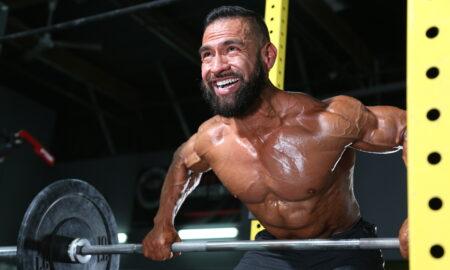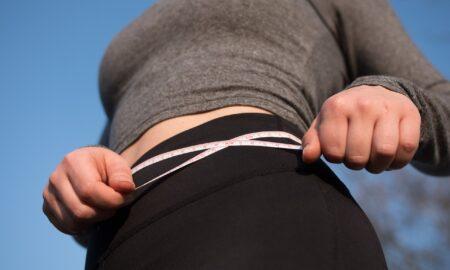Q: I met you last fall at the NPC Natural Crystal Cup in Anchorage, Alaska. As I prepare for three shows, I have been trying to find info on water. I want to compete hydrated, but it seems like it’s all a secret. Do you compete hydrated or do you cut water? I’m a drug-free 44-year-old female firefighter and try to do this for my health. The water-cutting thing messes my body up, and I always look worse onstage when I do it. I always look full in the gym. I weigh 147 pounds now—it’s the off-season—and I’m at 10 percent bodyfat. I’ve packed on a few pounds of muscle, but burning bodyfat naturally seems slow; I see other competitors drop bodyfat like the wind—of course, many of them are 20 years younger than I. How much cardio do you do? If I’m not 4 or 5 percent bodyfat, will the hydration technique work for me? How do I cycle carbs? I’m keeping my sodium around 1,000 now.
A: Those are great questions. I’ve written about the dehydration issue previously, but with a lot of people getting ready for the 2009 physique season, I’ve been asked about it quite often in the past few weeks.
No, I do not dehydrate myself for competition. In fact, as a drug-free bodybuilder I want to be as hydrated as possible on contest day. On the day before a show I drink 1.5 to two gallons of distilled water. On the day of the show I keep water with me all the time and drink whenever I’m thirsty. The whole idea of dehydrating for competition came from bodybuilders who use exogenous testosterone or other anabolic steroids, which cause edema, or water retention. They typically use a prescription diuretic to lose the excess water caused by the use of androgens. If drug-free competitors dehydrate themselves, they lose muscle cell volume and blood volume. Muscle tissue is almost 75 percent water. Blood is about 83 percent water. Bodyfat is only about 25 percent water. If you dehydrate yourself for a contest, you’ll end up smaller, flat and less vascular, and you may have difficulty getting a pump. It sounds as if you’ve seen that happen.
As a drug-free bodybuilder you want to have as much fluid in your muscle cells and in your blood as possible. When your muscle cells are fully hydrated, they’re larger, giving your physique a much fuller appearance. Your skin is also stretched more tightly, which makes you look harder. With maximum hydration of your blood volume, your vascularity will be more pronounced and your pump more dramatic. Isn’t that what every bodybuilder wants when he or she steps onstage—or even at the beach or pool?
What you don’t want is water retention, which makes you look softer. Among the things that cause water retention is taking in something that’s high in sodium. Many bodybuilders compound the problem by following a very-low-sodium diet for weeks or months in preparation for a contest. That will make your body more sodium sensitive, which causes you to retain even more water whenever you inadvertently eat or drink something high in sodium. I normally put some salt on my food on a daily basis, and I cut back on salt only the day before a contest.
Another thing that can cause fluid retention is allergies. They can range from airborne allergies to mild food allergies. Either can cause you to retain water under your skin. I’m very allergic to a lot of airborne stuff and had to take weekly allergy shots when I was a kid. Just to be on the safe side, I take a mild antihistamine like Claritin the evening before a show and again on the morning of the show. When it comes to mild food allergies, you either have to go to a specialist and be tested or pay close attention to the way your body looks after you’ve eaten certain foods.
For example, early in my bodybuilding career I read that a very large percentage of Americans have a slight food allergy to wheat products. I started cutting grain products out of my diet the week before a contest, and I was able to step onstage with a much harder appearance. I learned that I’m most allergic to corn.
The third thing that can cause fluid retention is overcarbing. That happens most often when physique athletes try to carb deplete, then carb load. I abandoned that practice many years ago. I found that I lost too much fullness during the carb-depletion phase, and if I ate enough carbs during the loading phase to regain it, I also ended up retaining excess water.
What works best for me is cutting my carbohydrate intake by 10 to 15 percent the week before a show. Since I’m also tapering back my workout volume and intensity the last few days, that enables me to maintain my muscle glycogen stores, giving my muscles a full appearance and stretching my skin very tightly. While many studies have shown that supercompensation of glycogen stores does occur after glycogen depletion followed by a loading phase, they were typically done with endurance athletes, who don’t have to worry about a little softening of their appearance on race day.
I often see bodybuilders sitting backstage feverishly shoveling rice, sweet potatoes or dried fruit into their mouths before prejudging in an effort to “fill out.” In my estimation that’s way too late. It puts bulk into your GI tract and can easily cause bloating in the midsection. I want my waist to be as small as possible when I step onstage. So on contest day I get up very early and have a breakfast of three scrambled eggs and a small cup of fruit. After that I try not to eat anything else before I start pumping up to go onstage—assuming prejudging is in the morning. Once I start pumping up, I have one or two packets of Power Gel to keep my blood sugar up for the rigors of pumping up and posing. Again, I always keep water with me and drink whenever I’m thirsty.
Now, regarding your observation that it seems to be harder for natural bodybuilders to lose bodyfat, that’s true. Being a drug-free bodybuilder is definitely more difficult, and it takes much more patience. A bodybuilder who’s using drugs can cut calories much more dramatically during precontest dieting and not have to worry about losing muscle. Many people who are willing to use bodybuilding drugs also use clenbuterol or thyroid medications to speed fat loss. The thing to remember is that what someone else does in his or her contest preparation has no effect on you. You control how you prepare. It’s just a fact of natural bodybuilding life that you won’t be able to put on muscle or lose bodyfat as fast as someone who chooses to use the drugs. You just can’t worry about that. You have to focus on being consistent and doing everything right. Your goal for each show should be to improve your physique. If you derive your satisfaction from improving and being the best that you can be, you’ll never be unhappy with your results as long as you’ve done everything you could possibly do to fully prepare.
How much cardio do I do? As little as possible. I don’t enjoy cardio. In 26 years of preparing for shows, however, there’s been only one year that I didn’t have to do it. How much you need is something unique to you and your circumstances. I always tell my athletes to do as little as they can get away with while still losing bodyfat at the rate they need to lose it. Several male clients of mine have gotten into ripped condition without doing any cardio whatsoever. I’ve never had a female competitor who didn’t have to do it.
I like to plan for at least one week of precontest diet and training for every pound of bodyfat I need to lose. When I start my precontest diet, I also start doing 20 to 30 minutes of cardio first thing every morning. I remember in 1987 I lost too much weight in the first two weeks. I stopped doing cardio and was able to get shredded without it during my contest training. In no other year has that been the case.
When I hit a fat-loss plateau, I add another 20-to-30-minute session in the evening after I finish work. There have been years when I’ve gotten into fantastic shape doing just 30 minutes per day. In years when my metabolism was crawling, due to too much dieting and injuries, I sometimes did as much as 2 1//2 hours per day. So there’s no way to tell you exactly how much cardio to do. Start off at 20 to 30 minutes per day. Do it seven days per week to stimulate your metabolism. Increase it only as much as necessary to keep the fat coming off. Keep doing cardio right up to contest day. By that time your body is very conditioned to it. I’ve had friends who cut out their cardio the week before the show and ended up losing hardness while not getting any fuller.
Good luck with your contest prep for 2009. I agree with you: Bodybuilding should be about being healthy. Live like a champion every day; train like a champion every workout.
Editor’s note: See Dave Goodin’s new blog at www.IronManMagazine.com. Click on the blogs selection in the top menu bar. To contact Dave directly, send e-mail to [email protected]. IM




















You must be logged in to post a comment Login